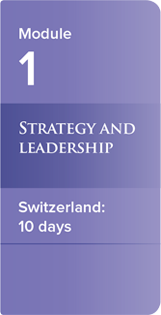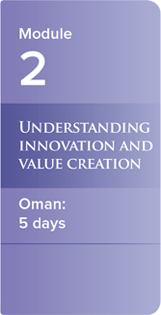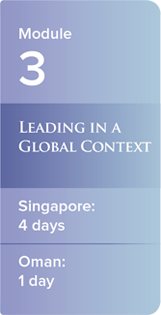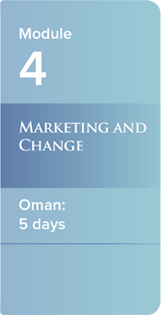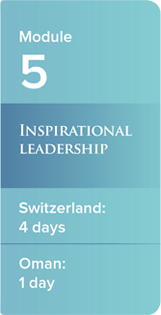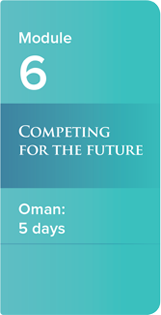



The program will kick off with module one which will cover both strategy and leadership. This module is divided into four parts.
Part 1 focuses on developing the skills and knowledge to think and act strategically. Participants will be introduced to the seven seismic shifts that occur when a manager makes the transition to a leader.
Part 2 consists of a four-day leadership immersion in the Swiss Mountains where the participants will work with IMD faculty members and coaches to understand and refine their personal leadership knowledge and skills.
Part 3 will focus on operational strategy and business models, including a company visit.
Part 4 will launch the strategic projects process with McKinsey & Company.
Module 1 focus areas
- Understand the key global trends that show where the world is moving, what is moving it, and how countries and organisations compete
- Understand key economic, political, social, technological, regional, and regulatory trends affecting the Middle East region
- Based on the current reality, develop an ability to design strategies that are resilient to changes in the external environment
- Develop an ability to clearly differentiate between good and bad strategy
- Understand the seven key transitions of becoming a leader: from business strategist to enterprise portfolioist, from resource requester to resource allocator, from coordinating change to championing change, from leading a team to leading the team, from talent utilizer to talent builder, from “a voice in the crowd” to “the voice of the crowd”, and form internal controller to external influencer
- Learn what it takes to become an authentic leader and to develop your leadership potential
- Find the right balance between operational and visionary leadership
- Gain a fuller understanding of your personal strengths and weaknesses as a leader
- Understand how to conduct honest conversations on difficult topics and how to give and receive constructive feedback

This module will cover two topics. First, it will build the strategic financial acumen of participants through sessions on finance and value creation. The participants will be given the tools to make well informed financial decisions, including coverage of financial statements, financial ratios, cash flow and financial value creation. They will also learn how to value an organisation, and understand the valuations of financial markets, leading to a discussion of mergers and acquisitions. Finally, they will cover the financial trends that will affect future competitiveness in the Middle East and across the world.
Secondly the module will look at the role of innovation, entrepreneurship, and breakthrough thinking in business. Corporate innovation will be studied from a variety of perspectives, including how to innovate across the organisational value chain, how to build a culture of innovation, and how to use innovation to disrupt organisations and industries. We will also explore a number of practical techniques to promote more effective innovation.
On day 5, participants will work in their groups to progress their breakthrough projects.
Module 2 focus areas
- Learn to analyse and interpret financial statements
- Understand the dynamics of value creation and value capture
- Understand key financial statistics and ratios
- Learn how to value a company or business unit
- Understand the key issues in mergers and acquisitions
- Understand how innovation capabilities can be built across the organisational value chain
- Develop innovative and disruptive thinking skills
- Appreciate the distinction between incremental and disruptive innovation and learn to manage both
- How to build a culture of innovation within an organisation


The third module will take place in Singapore and will focus on how to become a global leader. It will look at cross-cultural management and explore the skills required to lead in a multi-national setting, while also exploring trends within emerging Asian markets and Singapore’s success as a city-state. During this module, participants will look at digital technologies and trends that are reshaping the business world globally.
Module 3 will use the opportunity of being located in Singapore to experience and understand the economic and developmental journey that the nation has experienced over the last few decades. It will look at the innovative ways through which Singapore has developed one of the world’s most respected public and private sectors.
The last day will be allocated for breakthrough project work.
Module 3 focus areas
- Learn to assess the ability to lead and manage in a global world, evaluating your own competencies and those of others
- Learn how to manage across cultures within a multinational organisation
- Enhance cultural intelligence and learn to communicate effectively across cultural divides
- Learn about reverse innovation and the rising economic power of developing nations
- Learn about the key economic, social, political, and technological trends that are driving change across Asia
- Learn about Singapore’s strategy to transform a small city-state into a global economic and cultural hub
- Learn the latest digital trends in analytics, social media, mobile solutions, and cloud platforms
- Learn how to design, develop, and lead a digital business transformation

This module will focus on different aspects of Marketing, including consumer insight, branding, advertising and promotional strategy. It will also cover important elements of managing the process of change through cases and examples. Finally participants will have the opportunity to examine the problem of organisational complexity and the benefits and strategies of simplification.
Day 5 of the module will be allocated for breakthrough project work.
Module 4 focus areas
- Understand how to leverage marketing and branding for competitive advantage
- Gain deep insights into consumer behaviour
- Understand the importance of authority and urgency when implementing change in an organisation
- Learn to manage a team in situations where you have a lack of either authority or power
- Learn the important distinction between good and bad organisational complexity
- Develop a strategy to promote simplification and build a culture that avoids the build-up of bad complexity


During the fifth module back in Switzerland, participants will reacquaint themselves with their IMD coaches and continue their leadership journeys. Between modules 1 and 5, participants will obtain extensive 360 degree feedback on their leadership competences from colleagues. This feedback will be reviewed and discussed during this module. The participants will also go through extensive communication and media training. Finally, IMD faculty will revisit the topic of strategic thinking and apply new and different lenses to problem solving and decision making.
On the final day participants will work in their groups to progress their breakthrough projects.
Module 5 focus areas
- Reflect on your leadership development journey; identify areas of progress and define continuing goals
- Learn how to lead through your management teams
- Understanding how to influence and inspire the organisation through your words and behaviours
- Understand the dynamics of strategy and operations for family businesses
- Understand how to manage the interests of multiple stakeholders – a value constellation
- Appreciate the importance of status, confidence, and managing colleague/client relationships
- Develop skills to deal with strategic communication and media management
- Develop the ability to communicate with confidence and impact in front of an audience
- Practice new communication techniques and receive individual feedback
- Understand ethical and sustainable dimensions of management, including benefits and risks
- Develop a competence for structured thinking that is mutually exclusive and collectively exhaustive
- Develop a competence for out of the box radical thinking

During the final module, the seven seismic shifts will be reviewed to assess the participants’ journey from manager to leader. They will test these skills in a series of strategic exercises and ‘war games’. Focus will also be placed on board composition and management. Time will also be allocated to refining the breakthrough strategic projects that are to be presented to a panel of cross-sector high profile Omani leaders.
Module 6 focus areas
- Learn key elements of strategy execution and implementation
- Make decisions under pressure with limited information
- Understand competitive dynamics and react to strategic moves
- Develop an implementation roadmap
- Understand the dynamics of well-functioning boards
- Develop the skills to become a productive board member
- Practice presentation skills in front of senior executives
The PPP has worked closely with IMD to develop a comprehensive learning process. It draws on intellectual and experiential methodologies to deliver impactful learning and offer the opportunity to network with a broad range of leaders and thinkers. Participants will be exposed to a variety of models, ideas and practical experiences that blend theory with practice.
The program is delivered in English by a consortium of world-class faculty and senior practitioners. This intensive curriculum, which covers a range of business and leadership topics, is presented in six modules over the course of one year. Three modules will be conducted in the Sultanate and three will be abroad (two at IMD’s campus in Switzerland and one in Singapore). The program requires a considerable commitment from participants throughout the year, including pre and post module preparation work. In addition, participants will be expected to work in groups on real-life projects of strategic importance to the Sultanate’s private sector.
To ensure a rewarding and diverse learning journey for the participants, the program is designed using the following methodologies:
Classroom Learning
The classroom modules are an integral part of the learning journey. They draw upon latest research and learning methodologies to introduce new ideas around leadership and management. The modules will challenge participants' existing thinking and help catalyse new ways of leading and managing in their organisations.
Personal One-on-One and Team Leadership Coaching
Coaching is a key element of the program to shape and drive change at a personal level. It will help participants develop their self-awareness, interpersonal and team leadership capabilities. Each participant will be assigned a world-class IMD coach who will work with them individually and in small groups. The coaches will challenge, support and encourage participants to embark on a journey of discovery and positive change to maximise their performance.
Experiential Learning
Learning is most effective when it is practised and applied. An essential element of the learning journey is experimenting and applying the theory back at the workplace – testing different approaches to leading the business, managing people and delivering results. The program will be enriched with case studies, field visits, business simulations, and role plays that will allow participants to engage, practise, and reflect on what they have learned.
Applying what has been learned
An integral component of the program is the application of what has been learned to the development of real-life projects. The Breakthrough Projects have been designed in partnership with McKinsey & Company and are aimed at delivering sustainable value in line with Oman’s national agenda.
The Breakthrough Projects will be related to concrete business opportunities in a range of important fields from Oman’s private sector such as infrastructure, logistics, tourism and agriculture, among others. These promise to be thought-provoking exercises based on key challenges and opportunities.
Participants will work in groups to develop their projects during the course of the program. They will be supported throughout and given access to relevant experts for advice and mentoring. On the last day of the sixth module the groups will demonstrate the results of their learning by presenting their strategic projects to a senior public and private sector audience.
Once you have completed the formal learning - the classroom modules and the coaching - and presented your strategic projects to a panel of senior private sector leaders, then you will graduate from the National CEO Program. You will attend your Graduation Ceremony during which you will be presented with a Certificate as a Graduate of the National CEO Program and formally achieve Alumnus status of IMD.
Applications closed

SAT
APRIL
11th
Interviews closed

SUN
MAY
3rd
First intake announced

THU
MAY
7th
Module 1 commences

SUN
MAY
31st
Admission criteria
